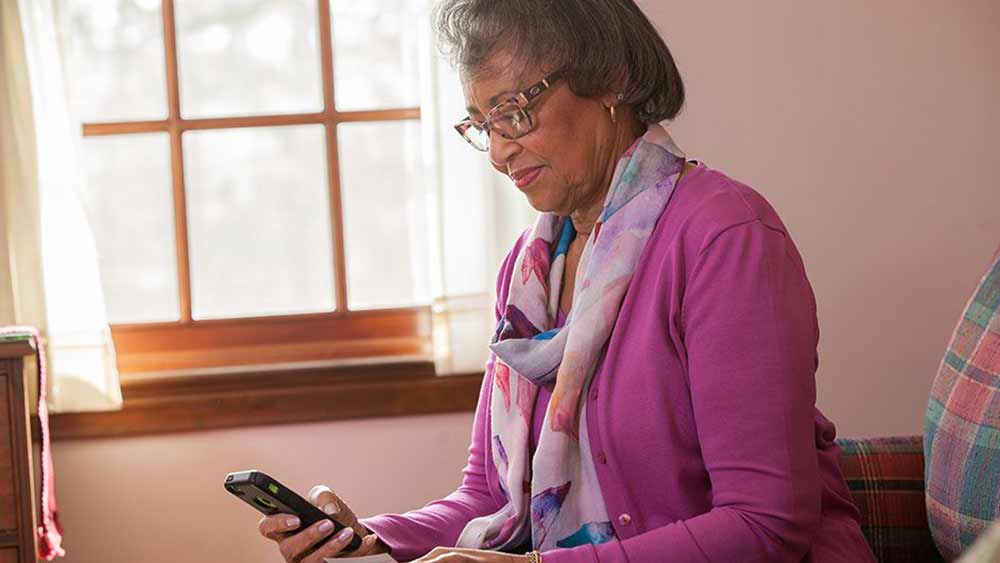

Smartphones Are More Important Than Ever - But Be Careful
These days we’re relying on our smartphones to stay connected. We’re talking and video chatting with friends and loved ones whom we can’t visit in person. We’re ordering up foods and ride shares with apps. We’re spending more time on social media, taking photos and posting them instantly. Predictions are that even as things start getting back to normal after the pandemic, older adults will continue using their smartphones much more than before.
This is a good time to check out some safety warnings connected to smartphone use. Here are five questions to ask:
Is your smartphone a “Trojan horse” for germs?
Biomedical scientist Lotti Tajouri of Bond University in Australia warned that our smartphones could be harboring the germs that cause COVID-19. “They have temperature control, we keep them in our pockets, and we are addicted to them,” said Tajouri. “We talk into them and deposit droplets that can be full of viruses, bacteria—you name it. We eat with them, so we give nutrients to microorganisms. You can wash your hands as many times as you like—and you should—but if you then touch a contaminated phone, you are contaminating yourself all over again. Think of your phone as your third hand.” Tajouri says that regularly cleaning our phones, including the case, could help slow the spread of the virus. An important reminder: Some disinfecting products can damage your phone. Before you clean it, check with the dealer where you bought it, or the website of the phone manufacturer.
Is your smartphone a culprit in distracted driving—or walking?
A 2019 study from Rutgers University detected a steady increase over time of injuries due to car crashes and pedestrian falls caused by people using their smartphones. Experts from the University of British Columbia recently noted that in Canada, distracted drivers now are responsible for more collisions than drunk drivers—and smartphone-related injuries to pedestrians are on the rise in that country, as well. Before taking a call, texting or having a video chat, pull over if you’re driving, or stop and step aside if you’re on foot. Better yet, leave your phone at home or turn it off if possible—it’s hard to resist! “Because we’re so phone driven, the tendency is when somebody calls us or texts us, we want to respond immediately,” notes National Institutes of Health expert Dr. Bruce Simons-Morton. Even if you’re just walking around the house, take care that phone use doesn’t lead to carelessness.
Exercising while talking—good or bad?
Going out for a socially distanced walk or jog is recommended for most of us these days, and you’re probably seeing more people around the neighborhood with their smartphones. Studies show that listening to music can help us keep up the pace, and fitness apps help us see how we’re doing. But slowing down to take a call or read a text, while wise, can mean we’re lowering the intensity of our workout. Michael Rebold, Ph.D., of Hiram College said, “If you’re talking or texting on your cellphone while you’re putting in your daily steps, your attention is divided by the two tasks.” With this type of multitasking, we can go from working hard to hardly working!
Is your smartphone a pain in the neck (or hands)?
Orthopedists are seeing more patients with tendon and nerve damage caused by smartphone-related strain. They advise users to practice better body mechanics when using their phones. Avoid “text neck” by holding your phone at varied angles rather than continually hunching over it. “For every inch your head moves in front of your body, 10 pounds of pressure is added to your shoulders,” notes Orlando Health physiologist Nathaniel Melendez. “If, for example, your head is four inches in front of your body when you're looking down at your phone, that’s like having a child sitting on your shoulders that whole time.” Take a break to stretch every now and again. And if you’re experiencing pain in your hands, fingers or wrists, ask your doctor about recommended ergonomic changes to avoid repetitive strain injuries.
Is your phone keeping you up at night?
More of us are bringing our smartphones to bed with us. Rather than reading ourselves to sleep with a book, we’re staring into our phones. A few minutes can stretch to hours as we’re tempted to check our email or social media posts one last time. Who doesn’t have a friend or relative who forgets time zones and texts us right out of a good night’s sleep? And the blue wavelengths of light our smartphones emit beam directly into our eyes, upsetting our natural sleep-wake cycle and suppressing our body’s secretion of melatonin, the hormone that regulates sleep and wakefulness. (One bit of good news: According to the American Academy of Ophthalmology, staring into any screen for hours can cause eyestrain, but there is no evidence that blue light damages the eyes.)




